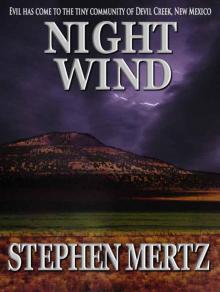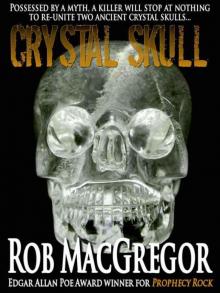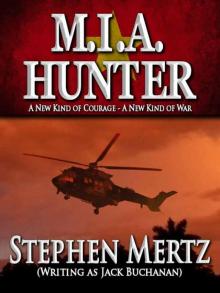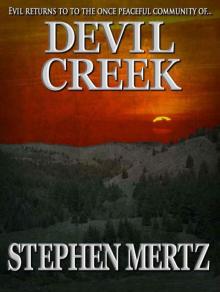- Home
- Mertz, Stephen
Devil Creek
Devil Creek Read online
DEVIL CREEK
By Stephen Mertz
Digital Edition published by Crossroad Press
Copyright 2013 / Stephen Mertz
Copy edited by: Anita Lorene Smith
Cover image courtesy of:
http://evelivesey.deviantart.com/
LICENSE NOTES
This eBook is licensed for your personal enjoyment only. This eBook may not be re-sold or given away to other people. If you would like to share this book with another person, please purchase an additional copy for each person you share it with. If you’re reading this book and did not purchase it, or it was not purchased for your use only, then you should return to the vendor of your choice and purchase your own copy. Thank you for respecting the hard work of this author.
Meet the Author
Stephen Mertz has traveled the world as a soldier, adventurer, and writer. His novels have been widely translated and have sold millions of copies worldwide. He currently lives in the American Southwest, and is always at work on a new novel.
Book List
Novels:
Blood Red Sun
Devil Creek
Dragon Games
Night Wind
The Castro Directive
The Korean Intercept
M.I.A. Hunter Series:
M.I.A. Hunter
M.I.A. Hunter: Cambodian Hellhole
M.I.A. Hunter: Exodus from Hell
M.I.A. Hunter: Blood Storm
M.I.A. Hunter: Escape from Nicaragua
M.I.A. Hunter: Invasion U.S.S.R.
M.I.A. Hunter: Crossfire Kill
M.I.A. Hunter: Desert Death Raid
M.I.A. Hunter: L.A. Gang War
M.I.A. Hunter: Back to ‘Nam
M.I.A. Hunter: Heavy Fire
M.I.A. Hunter: China Strike
DISCOVER CROSSROAD PRESS
Visit our online store
Subscribe to our Newsletter
Visit our DIGITAL and AUDIO book blogs for updates and news.
Connect with us on Facebook.
DEVIL CREEK
For Kathleen Cowles
Chapter One
Robin would always remember the precise instant, two years earlier, when she first realized that, underneath the skin, there is just no telling for sure about anyone.
She had been walking out of Merrill’s Market, pushing her grocery cart, exactly as she was doing today. But on that afternoon—those two years ago that seemed like two lifetimes ago—she had been drowning in a world of pain.
Devil Creek was not a large enough community to interest any of the supermarket chains, not even the smaller regional ones. An isolated community of 3700 souls, nestled in the mountains of southwestern New Mexico, the local residents depended on Walt and Jill Merrill’s family market to supply their everyday needs. Folks made the one-hour drive to Las Cruces for nearly everything else.
Merrill’s was a tidy, efficiently run store, stocked with a decent selection of every essential. The route man for the Las Cruces paper also supplied Merrill’s with goodies from the Dunkin’ Donuts in Cruces on a daily basis, and country music twanged from a cheap boom box behind the register. One or both of the Merrills could always be counted on to be working the one-lane register, with a couple of minimum-wage high school kids on hand to sack and help the elderly or infirm with their groceries.
At any given time there were at least ten or a dozen local residents wheeling their carts up and down the shiny, well-lighted aisles, and on any given day you could count on running into someone you knew and ending up having a neighborly conversation. Life moved at such a leisurely pace in the Southwest, especially in the rural areas, summer or winter.
People took their time to ask how your tomatoes were doing. Or how your mother was, whom they had never met. But they asked because they cared about how you were doing. Or the conversation would touch on the weather, with reference to how the high school team was making out this season, whatever the season might be.
Robin Curtis had taken awhile to adapt to this new pace, as had Paul. It was quite a change from the freeways and cell phones and malls of Chicago. More often than not, cell phones didn’t even work this far out of society’s loop. Eventually, though, the relaxed rhythms of this region had become her own.
Merrill’s was a friendly store where people cared, and that was exactly the way she would describe the town Devil Creek.
She knew that now.
This place was home for her and her son … and her husband. Mike was on assignment this afternoon but would be home for dinner, and Paul was waiting for her in the parking lot. And she could not think of anyplace she would rather be.
But no, it had not been like that two years ago, when a passing glance at her reflection, as she had wheeled her cart of groceries out of Merrill’s, had brought to her an epiphany.
At that point, her world had been shattered, or so it had seemed at the time. She and Paul had been swept up in a chain of terrible events, shortly after moving to Devil Creek. There had been death, and one endless night on the mountain, knowing the unspeakable fear that her missing son was among the dead.
When it was over, Paul and Michael had been airlifted off the snow-swept mountain to the hospital in Las Cruces.
She had been commuting between Devil Creek and Cruces for about a week because there wasn’t money to rent a motel room in Cruces while she waited for Mike and Paul to be released from the hospital.
Yes, a world of pain… .
She personally had not endured physical injury that terrible night, but the mother in her would have given anything to have taken the bullet that wounded her son.
Paul’s wound at least had been slight, and the doctors guaranteed his recovery. Mike Landware had been more seriously injured, and for a few days there, the man she had fallen in love with had hovered on that razor-thin Intensive Care edge between life and death.
Her waking hours during those days had been filled with anxiety and her sleep could barely be called that. She had moved to Devil Creek, leaving Jeff and a rotten, abusive marriage behind, and had traveled here cross-country with her then-twelve-year-old son, to forge a new life of independence. It had taken the horrific events of that night—it had taken the psyche-pummeling trauma of it—to make her see that no one should be alone for very long. Michael had taught her that, with the pureness and steadfastness of the love he professed for her. And they had fallen in love. And then, in one mad explosion of violence that brought Paul and Michael down, she saw herself losing everything she had just found, everything being unfairly, painfully stolen from her.
Hurting inside, yes. Feeling like she was fixing to die.
And yet … any yet, when she had glimpsed her reflection that day two years ago in the midst of it all, lo and behold, she had appeared wholly normal!
Seeing herself from the outside, as the passing reflection had allowed her to do, she had seen a set, determined face, but she had seen none of the bleeding that was inside of her. No one seeing her at that moment, behind her shopping cart, leaving the market and stepping into the sunshine-filled parking lot, would have guessed in a million years the depth of her anguish, the numbness of her psyche, the ache of her loss.
That was her epiphany.
She found herself wondering, how many people she had passed on the street in her life—in stores, in malls, in the park, on the sidewalk—how many of those people strolling by, with their expressions set, were bleeding inside, agonizing in their personal lives of torment, exactly as she was?
That frozen moment of time from two years ago returned to her briefly now, as she briskly rolled her cart past the ice machine with its metal door, placed just inside the main entrance so customers could pay for their ice with the rest of their groceries, t
hen pick up the bag of ice last thing as they were leaving the store. This polished metal door was where she had seen her reflection those two years ago, and had her epiphany. After that, she had never looked at people the same way again.
She paused now for the briefest moment, to study the woman looking back at her from the reflection in that polished metal.
Same face. Same mind. Same heart. Same soul. But yes, two years had passed.
She had been a pretty-enough girl and a not unattractive woman, and she still was, she supposed. But she was knock-knock-knocking at the door to middle age, there was no denying that. A few more strands of silver than two years ago in her chestnut hair, worn shoulder-length. The face gazing back at her had steady eyes, with her mother’s high cheekbones and a full, sort-of-pouting lower lip that, well, could only accounted for genetically by some long-deceased ancestor of an overly libidinous nature. She had her father’s jaw that could thrust out pugnaciously if someone got her goat or angered her, which wasn’t often. The tiny lines around her eyes were becoming permanent creases, but she didn’t mind. What could you do?
Life was good.
She continued out of the store, pushing her cart past the glass doors that automatically whispered apart for her. She emerged into an absolutely gorgeous autumn afternoon.
The sky was a crisp blue with only a trace of wispy clouds far to the south, beyond the mountain of dense, dark pine that surrounded the town.
Sunshine danced off her the brim of her cap and off her bare arms, warming her with a good feeling. She felt a new bounce to her step. Seeing her reflection like that, and remembering that instant of epiphany two years ago and all of the healing that had taken place since, made her realize again how good her life truly was.
She wanted life to go on like this forever.
Chapter Two
She angled her grocery cart into the lane of perhaps a dozen cars, toward where she had parked the Subaru and left Paul, reading his book.
It was the same Subaru they had arrived here in, those two years ago. The dependable little black vehicle had proven itself on the long haul across the continent from Chicago, and had served them well in their new hometown from that day until this. A teacher didn’t earn that much, and falling in love with a guy who wrote for a living wasn’t exactly an upgrade in financial security. That was okay, except that there was Paul’s education to consider, money to be squirreled away for that and for a rainy day. They’d found an ace shade tree mechanic, down the country road from where she and Mike and Paul lived, who had kept the Subaru running without serious automotive mishap since she’d come to Devil Creek.
As she approached it with her cart, she could see Paul leaning against the front hood on the passenger’s side with her back to him, and at first she thought he was standing there reading his book; that he had stepped from the car to enjoy the sunshine while he read, exactly as she would have done.
Her son was a husky, sandy-haired boy. Five-foot-eight, one-hundred and sixty pounds, wearing the standard teenage uniform of T-shirt, jeans and athletic shoes. Paul’s hair was never combed, even when he tried to keep it in place to please her, and the girls his age thought he was handsome, or at least cute. So did Robin.
As she got closer to the Subaru, she saw from her advancing angle that Paul was not reading the collection of Bradbury she’d left him working on ten minutes earlier.
Paul and his age group encountered each other at Merrill’s as often as adults did, and she would not have been surprised to see him standing there chatting up a girl, or several as was sometimes the case, or clowning around with his friends from the soccer team.
He was speaking with a woman.
She was Robin’s age, maybe a few years younger. Medium height. Good figure. A stylish ensemble with a flare of color from a bright print blouse, white slacks with matching shoes and purse and a wide-brimmed straw hat. She stood about Paul’s height, so that she and Robin’s son were at about eye-level.
Robin had the impression that a conversation was well in progress. In fact, the woman was touching Paul’s wrist with her fingertips as she spoke to him.
Then something strange happened.
The woman glanced over Paul’s shoulder and she saw Robin approaching, and she chose that moment to say something in parting to Paul, with a slight wave of her hand. She turned away, and in the time it took Robin to close the distance, to join her son at the Subaru, the woman eased into a smart little silver Altima. She moved with a taut yet graceful economy of movement.
Paul became aware of Robin’s presence then, and turned to her with a smile on his handsome, bronzed face.
“Hi, Mom.”
The Altima purred to life and backed out of a parking space with the woman behind the steering wheel not making eye contact with Robin or Paul. The Altima purred out of the parking lot, made a right-hand turn, properly signaled, and headed off in the direction leading out of town.
“Who was that, honey?”
“Jeez, Mom, how old do I have to get before you stop calling me ‘honey’?”
“Who was that, Paul?”
“Gosh, I don’t know, just some lady.” He was already shrugging it off, or seemed to be.
She opened the rear hatch and Paul began transferring plastic-bagged groceries from the cart into the Subaru like the near-perfect son he was.
No one was perfect, of course, and that most certainly was true of fourteen-year-old boys bursting with awakening hormones, curiosity and testosterone. But she treasured her relationship with Paul, which was as much a deep, abiding friendship, borne of the hardships they had endured—the agonizing collapse of their home life in Chicago, which now seemed to belong to another time. They had shared a cross-country road trip, a once-in-a-lifetime bonding experience, and those brutal events of two years ago … yes, the fires she and this fourteen-year-old endured had forged deeper bonds than normal for a mother and her son. There were, she knew, mothers and sons who quarreled bitterly and became estranged, but even the challenges of raising a strong-willed child had never detracted from her thankfulness that her son possessed exactly the personality traits that he did.
Paul wheeled the empty grocery cart back to the row of empty carts in front of the store.
Robin opened the driver’s side door of the Subaru and started to get in behind the steering wheel; then she found herself pausing to stare off across the roof of the Subaru.
A break in the shrubbery bordering the parking lot afforded her one last view of the Altima. The sun danced off its silver, sleek lines. Then it was gone from her sight.
She stared after it anyway. She stared into space. Her subconscious tremored with a quiver that she could not identify.
It was as if the departing car had left a mental tendril that had tickled her subconscious, as a jet leaves a vapor trail across the sky that soon dissipates and fades into nothing.
The feeling passed. The tendril evaporated.
The quiver in her subconscious subsided, leaving her with only the vague impression that something wasn’t quite right.
Chapter Three
“Who was that, honey?”
“Mom.”
“Paul, who was that?”
“Who was who?”
They had left the Subaru in Merrill’s parking lot and were walking up the block toward Donna’s Café.
Devil Creek was situated on a small flatland among rolling hills at the foot of the mountains. The streets were shaded, lined with well-maintained lawns and modest homes: a few mobile homes but mainly one-story adobe structures with wood frames. Church spires pointed to heaven for most of the Christian denominations, and the center of Devil Creek was a concentration of modern brick and plate-glass structures, dominated by the Town Hall, a one-level structure of red brick housing the city government offices and the police department. There was a hardware store, a gas station—repair shop, a small branch bank office, the lawyer’s office and a medical building where a dentist and a pair of family physic
ians shared space with a pharmacy.
Donna’s was opposite the park, where a fountain burbled with contentment near picnic tables, in the shade of towering ash and dogwood trees.
She and Paul paused at the corner for the one stoplight in town, at the main intersection where the state highway going south to Cruces intersected with the area’s main east-west county road. There wasn’t much traffic through this intersection—certainly not to someone who had spent years of her life driving urban freeways. But there could be a tendency on the part of some of the town’s good old boys, and some high-schoolers with drivers’ licenses, to take this intersection too damn fast. So she indicated to Paul that she wanted to wait for the light to change, even though the only traffic in sight at the moment consisted of no more than a Rotor Rooter truck lumbering in one direction and an ancient pickup truck with a camper shell coming from the opposite direction.
Without any rumble of traffic to have to speak over, Robin had decided to respond to that quiver and speak her mind.
“Paul, who was that woman you were talking to?”
Paul chuckled. “Jeez, you sound like Humphrey Bogart in one of those old detective movies you and Mike like to watch.”
“Don’t sass me, young man, and don’t dodge my question.” She said it lightly, but her words brought a frown to his tanned, handsome boyish face.
“I wasn’t sassing you.”
She sighed.
Fourteen. He was no longer her “little boy.” And yet he was still a boy. He and his friends still played in the woods, built snow forts in the winter and went camping in the summer. And boys Paul’s age were starting to pay attention to the girls, big time. And who could blame them, the way current fashion had these girls dressing so provocatively in their tight and revealing clothes. Robin was surprised that some of the parents let their girls dress that way for school. At Paul’s age, you could almost chart growth day by day, and her concerns about her son making the right decisions increased proportionately. A fourteen-year-old had a universe of things—temptations, important choices—that were barely options when she was that age.

 Night Wind
Night Wind Korean Intercept
Korean Intercept M.I.A. Hunter: Miami War Zone
M.I.A. Hunter: Miami War Zone Castro Directive
Castro Directive Blood Red Sun
Blood Red Sun M.I.A. Hunter
M.I.A. Hunter Devil Creek
Devil Creek